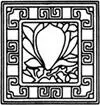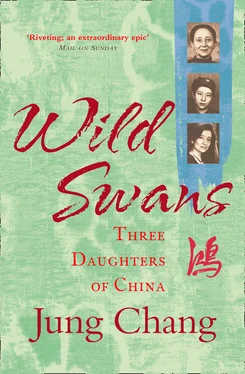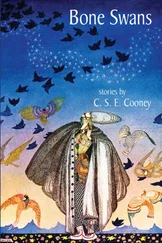During the Fair of the Town God’s Temple one year, my grandmother showed her a row of clay sculptures in the temple, all redecorated and painted for the occasion. They were scenes of Hell, showing people being punished for their sins. My grandmother pointed out a clay figure whose tongue was being pulled out at least a foot while simultaneously being cut up by two devils with spiky hair standing on end like hedgehogs and eyes bulging like frogs. The man being tortured had been a liar in his previous life, she said—and this was what would happen to my mother if she told lies.
There were about a dozen groups of statues, set amid the buzzing crowds and the mouth-watering food stalls, each one illustrating a moral lesson. My grandmother cheerfully showed my mother one horrible scene after another, but when they came to one group of figures she whisked her by without any explanation. Only some years later did my mother find out that it depicted a woman being sawed in half by two men. The woman was a widow who had remarried, and she was being sawed in half by her two husbands because she had been the property of both of them. In those days many widows were frightened by this prospect and remained loyal to their dead husbands, no matter how much misery that entailed. Some even killed themselves if they were forced by their families to remarry. My mother realized that her mother’s decision to marry Dr Xia had not been an easy one.

3
‘They All Say What a Happy Place Manchukuo Is’
Life under the Japanese
1938–1945
Early in 1938, my mother was nearly seven. She was very bright, and very keen to study. Her parents thought she should begin school as soon as the new school year started, immediately after Chinese New Year.
Education was tightly controlled by the Japanese, especially the history and ethics courses. Japanese, not Chinese, was the official language in the schools. Above the fourth form in elementary school teaching was entirely in Japanese, and most of the teachers were Japanese.
On 11 September 1939, when my mother was in her second year in elementary school, the emperor of Manchukuo, Pu Yi, and his wife came to Jinzhou on an official visit. My mother was chosen to present flowers to the empress on her arrival. A large crowd stood on a gaily decorated dais, all holding yellow paper flags in the colours of Manchukuo. My mother was given a huge bouquet of flowers, and she was full of self-confidence as she stood next to the brass band and a group of VIPs in morning coats. A boy about the same age as my mother was standing stiffly near her with a bouquet of flowers to present to Pu Yi. As the royal couple appeared the band struck up the Manchukuo national anthem. Everyone sprang to attention. My mother stepped forward and curtsied, expertly balancing her bouquet. The empress was wearing a white dress and very fine long white gloves up to her elbows. My mother thought she looked extremely beautiful. She managed to snatch a glance at Pu Yi, who was in military uniform. Behind his thick spectacles she thought he had ‘piggy eyes’.
Apart from the fact that she was a star pupil, one reason my mother was chosen to present flowers to the empress was that she always filled in her nationality on registration forms as ‘Manchu’, like Dr Xia, and Manchukuo was supposed to be the Manchus’ own independent state. Pu Yi was particularly useful to the Japanese because, as far as most people were concerned, if they thought about it at all, they were still under the Manchu emperor. Dr Xia considered himself a loyal subject, and my grandmother took the same view. Traditionally, an important way in which a woman expressed her love for her man was by agreeing with him in everything, and this came naturally to my grandmother. She was so contented with Dr Xia that she did not want to turn her mind even slightly in the direction of disagreement.
At school my mother was taught that her country was Manchukuo, and that among its neighbouring countries there were two republics of China—one hostile, led by Chiang Kai-shek; the other friendly, headed by Wang Jingwei (Japan’s puppet ruler of part of China). She was taught no concept of a ‘China’ of which Manchuria was part.
The pupils were educated to be obedient subjects of Manchukuo. One of the first songs my mother learned was:
Red boys and green girls walk on the streets,
They all say what a happy place Manchukuo is.
You are happy and I am happy,
Everyone lives peacefully and works joyfully free of any worries.
The teachers said that Manchukuo was a paradise on earth. But even at her age my mother could see that if the place could be called a paradise it was only for the Japanese. Japanese children attended separate schools, which were well equipped and well heated, with shining floors and clean windows. The schools for the local children were in dilapidated temples and crumbling houses donated by private patrons. There was no heating. In winter the whole class often had to run around the block in the middle of a lesson or engage in collective footstamping to ward off the cold.
Not only were the teachers mainly Japanese, they also used Japanese methods, hitting the children as a matter of course. The slightest mistake or failure to observe the prescribed rules and etiquette, such as a girl having her hair half an inch below her earlobes, was punished with blows. Both girls and boys were slapped on the face, hard, and boys were frequently struck on the head with a wooden club. Another punishment was to be made to kneel for hours in the snow.
When local children passed a Japanese in the street, they had to bow and make way, even if the Japanese was younger than themselves. Japanese children would often stop local children and slap them for no reason at all. The pupils had to bow elaborately to their teachers every time they met them. My mother joked to her friends that a Japanese teacher passing by was like a whirlwind sweeping through a field of grass—you just saw the grass bending as the wind blew by.
Many adults bowed to the Japanese, too, for fear of offending them, but the Japanese presence did not impinge greatly on the Xias at first. Middle- and lower-echelon positions were held by locals, both Manchus and Han Chinese, like my great-grandfather, who kept his job as deputy police chief of Yixian. By 1940, there were about 15,000 Japanese in Jinzhou. The people living in the next house to the Xias were Japanese, and my grandmother was friendly with them. The husband was a government official. Every morning his wife would stand outside the gate with their three children and bow deeply to him as he got into a rickshaw to go to work. After that she would start her own work, kneading coal dust into balls for fuel. For reasons my grandmother and my mother never understood, she always wore white gloves, which became filthy in no time.
The Japanese woman often visited my grandmother. She was lonely, with her husband hardly ever at home. She would bring a little sake, and my grandmother would prepare some snacks, like soy-pickled vegetables. My grandmother spoke a little Japanese and the Japanese woman a little Chinese. They hummed songs to each other and shed tears together when they became emotional. They often helped in each other’s gardens, too. The Japanese neighbour had very smart gardening tools, which my grandmother admired greatly, and my mother was often invited over to play in her garden.
But the Xias could not avoid hearing what the Japanese were doing. In the vast expanses of northern Manchuria villages were being burned and the surviving population herded into ‘strategic hamlets’. Over five million people, about a sixth of the population, lost their homes, and tens of thousands died. Labourers were worked to death in mines under Japanese guards to produce exports to Japan—for Manchuria was particularly rich in natural resources. Many were deprived of salt and did not have the energy to run away.
Читать дальше













